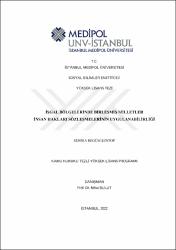| dc.contributor.advisor | Bulut, Nihat | |
| dc.contributor.author | Şentop, Seniha Begüm | |
| dc.date.accessioned | 2023-11-02T10:16:00Z | |
| dc.date.available | 2023-11-02T10:16:00Z | |
| dc.date.issued | 2022 | en_US |
| dc.date.submitted | 2022 | |
| dc.identifier.citation | Şentop, S. B. (2022). İşgal bölgelerinde Birleşmiş Milletler İnsan Hakları Sözleşmelerinin uygulanabilirliği. (Yayımlanmamış yüksek lisans tezi). İstanbul Medipol Üniversitesi Sosyal Bilimler Enstitüsü, İstanbul. | en_US |
| dc.identifier.uri | https://tez.yok.gov.tr/UlusalTezMerkezi/tezSorguSonucYeni.jsp | |
| dc.identifier.uri | https://hdl.handle.net/20.500.12511/11697 | |
| dc.description.abstract | Uluslararası insancıl hukuk bağlamında işgal, bir devletin egemenliği altındaki bir toprak üzerinde yabancı ve düşman bir kuvvet tarafından otorite kurulmasını ifade etmektedir. Bu bakımdan işgalin mevcudiyetinde belirleyici unsur, yabancı bir devletin egemen devletin toprakları üzerinde, söz konusu egemenin rızası olmadan ve geçici süre ile kontrol sağlamasıdır. İşgalde uluslararası insancıl hukuk ve işgal hukukunun uygulanmasında tereddüt yokken uluslararası insan hakları hukukunun uygulanabilirliği bağlamında tartışmalar mevcuttur. Bu kapsamda insan hakları sözleşmelerinin işgalde uygulanabilirliği meselesine ilişkin tartışmalar, üç ana konuda yoğunlaşmaktadır. Söz konusu tartışma başlıklarından ilki insan hakları hukuku ile genel olarak insancıl hukuku, özel olarak da işgal hukukunun ilişkisidir. Bu etkileşimin çözümlenmesinde farklı görüşler ortaya atılmıştır. Tartışmaya ilişkin bir diğer başlık, Birleşmiş Milletler insan hakları sözleşmelerde yer alan yetki klozlarıdır. Bu klozların sözleşmelerin uygulanma alanıyla ilgili ne ifade ettiği ve işgalde uygulanmalarının önünde bir engel teşkil edip etmediği tartışılmaktadır. İnsan hakları sözleşmelerinde yer alan derogasyon klozları ise tartışmanın üçüncü başlığını oluşturmaktadır. Bu doğrultuda işgalde derogasyon klozunun anlamı ve özel olarak Medeni ve Siyasi Haklar Sözleşmesi'nde yer almasının sözleşmenin işgalde uygulanmasına etkisi ele alınmaktadır. İşgal, hem devlet egemenliğinin hem de işgal bölgelerindeki sivillerin korunması bağlamında önem teşkil eden ve uygulamada halen örneklerine rastlanıldığından güncelliğini koruyan bir konudur. Çalışma bağlamında, literatürde nispeten daha az ele alınan Birleşmiş Milletler insan hakları sözleşmeleri çerçevesinde bir inceleme yapılmıştır. Çalışma ile işgalde BM insan hakları sözleşmelerinin uygulanmasına ilişkin teorik tartışmaların ortaya konması ve değerlendirilmesi amaçlanmıştır. | en_US |
| dc.description.abstract | In the context of international humanitarian law, occupation refers to the establishment of authority by a foreign and hostile force over a territory under the sovereignty of a state. In this respect, the determining factor in the existence of occupation is the temporary control of a foreign state over the territory of the sovereign state without the consent of the sovereign in question. While there is no hesitation in the application of international humanitarian law and occupation law in the occupation, there are debates in the context of the applicability of international human rights law. In this context, discussions on the applicability of human rights conventions in the occupation focus on three main issues. The first of these discussion topics is the relationship between human rights law and humanitarian law in general, and occupation law in particular. Different views have been put forward in the analysis of this interplay. Another topic of discussion is the jurisdiction clauses in the United Nations human rights conventions. It is debated what these clauses mean about the application area of the conventions and whether they constitute an obstacle to their application in the occupation. The derogation clauses in human rights conventions constitute the third topic of the discussion. In this respect, the meaning of the derogation clause in the occupation and the effect of its inclusion in the Civil and Political Rights Covenant on the implementation of the contract in the occupation are discussed. Occupation is an important issue in the context of both state sovereignty and the protection of civilians in the occupied areas, and it is still up-to-date as examples are still encountered in practice. In the context of the study, an examination has been made within the framework of the United Nations human rights conventions, which are relatively less discussed in the literature. With this study, it is aimed to introduce and evaluate the theoretical discussions on the application of the UN human rights conventions in the occupation. | en_US |
| dc.language.iso | tur | en_US |
| dc.publisher | İstanbul Medipol Üniversitesi, Sosyal Bilimler Enstitüsü | en_US |
| dc.rights | info:eu-repo/semantics/openAccess | en_US |
| dc.subject | Birleşmiş Milletler İnsan Hakları Sözleşmeleri | en_US |
| dc.subject | İnsan Hakları Sözleşmelerinin Sınır Ötesi Uygulanması | en_US |
| dc.subject | İşgal | en_US |
| dc.subject | İşgal Hukuku | en_US |
| dc.subject | Uluslararası İnsancıl Hukuk | en_US |
| dc.subject | Extraterritorial Application of Human Rights Treaties | en_US |
| dc.subject | International Humanitarian Law | en_US |
| dc.subject | Law of Occupation | en_US |
| dc.subject | Occupation | en_US |
| dc.subject | United Nations Human Rights Treaties | en_US |
| dc.title | İşgal bölgelerinde Birleşmiş Milletler İnsan Hakları Sözleşmelerinin uygulanabilirliği | en_US |
| dc.title.alternative | The applicability of The United Nations Human Rights Conventions in the occuped territories | en_US |
| dc.type | masterThesis | en_US |
| dc.department | İstanbul Medipol Üniversitesi, Sosyal Bilimler Enstitüsü, Kamu Hukuku Ana Bilim Dalı | en_US |
| dc.relation.publicationcategory | Tez | en_US |
| dc.institutionauthor | Şentop, Seniha Begüm | |


















